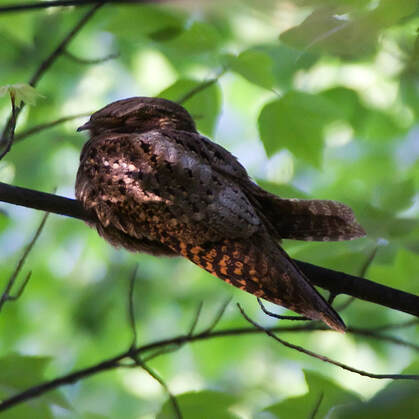Chuck-will's-widow, by Nathan Farnau.
Chuck-will's-widow: 2023-2025 species of Concern
|
A bird that is heard far more often than seen, the Chuck-will’s-widow’s distinctive call may be heard singing its name at dusk across the Georgia landscape on spring and summer evenings. Very little is known about this elusive, nocturnal species, in part, because they are notoriously difficult to locate. Their beautiful, mottled brown plumage provides perfect camouflage as they roost during daylight hours amongst dried leaves and tree branches.
Birds Georgia hopes to help fill in some of the data gaps for this near-threatened species and create more suitable habitat to help these birds, and, as such, we have selected the Chuck-will’s-widow as our 2023 to 2025 Species of Concern. Over the next three years, Birds Georgia will direct additional resources and expertise to the Chuck-will’s-widow —restoring native habitat, assisting with species-specific research, and engaging the public to help us better understand statewide population numbers and migratory behavior. |
About the CHuck-will's-widow
Chuck-will’s-widows, or “Chucks,” are one of three species of nightjars found in Georgia. Nightjars are medium-sized nocturnal birds characterized by long wings, short legs, and very short bills. Common Nighthawks and Eastern Whip-poor-wills are the two other nightjar species found in Georgia. Chucks spend the breeding season in Georgia and then migrate to the lowland forests of the Caribbean, Mexico, and Central America during winter.
Active at dawn, dusk, and on bright nights, Chucks fly low over the ground in search of insects, like moths and beetles, which they catch in their enormous, oversized mouths. Unlike owls which have acute hearing, Chucks hunt by sight in the dark. Their oversized eyes help them see insects in low light and their gigantic mouths provide some margin for error. A specialized anatomical feature, called rictal bristles, serves as a sensory mechanism allowing them to scoop up insects in the dark. Their mouths are so large, in fact, that on occasion these birds have been known to gulp down larger prey, like songbirds or bats.
Active at dawn, dusk, and on bright nights, Chucks fly low over the ground in search of insects, like moths and beetles, which they catch in their enormous, oversized mouths. Unlike owls which have acute hearing, Chucks hunt by sight in the dark. Their oversized eyes help them see insects in low light and their gigantic mouths provide some margin for error. A specialized anatomical feature, called rictal bristles, serves as a sensory mechanism allowing them to scoop up insects in the dark. Their mouths are so large, in fact, that on occasion these birds have been known to gulp down larger prey, like songbirds or bats.
The Challenges
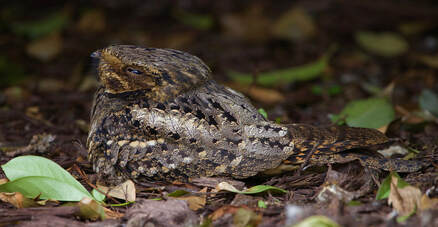 Photo by Nathan Farnau
Photo by Nathan Farnau
Chuck-will's-widows face a number of challenges, including
- Habitat loss and degradation
- Pesticide poisoning: Insects make up a large portion of this bird's diet and, as such, they are extremely susceptible to pesticide poisoning.
- Climate Change
- Building and vehicle collisions: Since these birds are nocturnal. they often fall prey to building and vehicle collisions during migration and during their nighttime hunting runs.
- Lack of good information about these life cycle of these birds. There's a lot that scientists don't know!
There's Still a Lot we don't Know
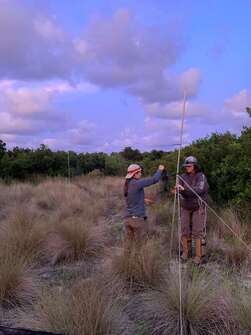 Preparing for a night of banding and measuring Chucks-will's widows. Photo by Emily Engle.
Preparing for a night of banding and measuring Chucks-will's widows. Photo by Emily Engle.
Chucks-will’s-widows may be found in a number of different habitats in Georgia, from grassy areas to forests to timber stands. Despite their widespread nature across the state, little is known about what attracts them to various habitats. Learning what these birds are keying in on in their habitats is a big key to figuring out how to make Georgia more hospitable for them.
Chucks-will’s-widows are what’s known as a data deficient species because very little is known about major aspects of their biology. This makes it difficult for scientists to make well-informed conservation decisions about how best to help this declining species because there is so little data. Through a concerted effort with partners, other scientists, and the public, Birds Georgia hopes to be able to fill in some of the missing information so that we can make better management decisions and ensure that our children and grandchildren will still hear the call of Chucks and other nightjars across Georgia.
Chucks-will’s-widows are what’s known as a data deficient species because very little is known about major aspects of their biology. This makes it difficult for scientists to make well-informed conservation decisions about how best to help this declining species because there is so little data. Through a concerted effort with partners, other scientists, and the public, Birds Georgia hopes to be able to fill in some of the missing information so that we can make better management decisions and ensure that our children and grandchildren will still hear the call of Chucks and other nightjars across Georgia.
How WE're Helping
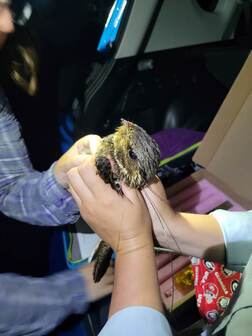 Photo by Emily Engle. Please note: these birds were captured and handled by trained biologists with proper state/federal permits. The birds were quickly processed and released.
Photo by Emily Engle. Please note: these birds were captured and handled by trained biologists with proper state/federal permits. The birds were quickly processed and released.
Over the next few years, Birds Georgia, in collaboration with multiple partners, hopes to help fill in some of the gaps about this species.
- In partnership with Clark Rushing, assistant professor in the Warnell School of Forestry and Natural Resources at the University of Georgia, and his lab students, Georgia Audubon has been assisting with radio tracking and GPS tagging Chuck-will’s-widows to learn more about the breeding habits of this species, their habitat preferences, as well as where these birds go in the winter months.
- Chucks-will's-widows rely on healthy insect populations.. Our habitat restoration work and native plant initiatives, in addition to our growing efforts with private landowners, will undoubtedly benefit this species since these programs increase healthy habitats, native plants, and the insect life they support.
- Programs like the Birds Georgia Habitat Stewardship Program and partnership programs with groups like the Georgia Forestry Foundation, National Resource Conservation Service, Chattahoochee RiverLands, the Jekyll Island Authority, and others are enabling Birds Georgia to build high quality bird habitat that will not only benefit Chucks, but also many other avian and wildlife species.
HOW YOU CAN GET INVOLVED
There are a number of actions you can take at home and in your landscape to help Chucks-will's-widows:
- Remove invasive plant species and replace them with native plant species that attract native insects, the primary food source for Chucks. Take it a step further and have your property certified as a Birds Georgia Wildlife Sanctuary.
- Don't use pesticides in your landscape. Use organic or natural alternatives, instead.
- Beginning in 2023, Birds Georgia is working with a community science program called the Nightjar Survey Network run by the Center for Conservation Biology to increase the number of birds being reported in the state.

